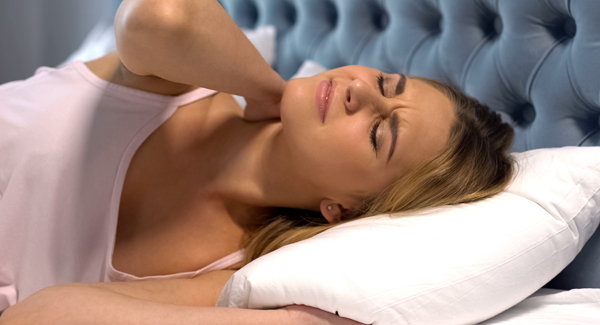Hip Pain at Night?
Learn about 4 common causes and when to see a doctor.
By Linda Rath | Aug. 8, 2022
Lots of things can keep you tossing and turning at night. Hip pain shouldn’t be one of them. Yet more than one-third of U.S. adults report that hip, knee or foot pain keeps them awake.
Nighttime-Only Hip Pain
If you have hip pain only at night, odds are the culprit is your sleep position or mattress. Side sleepers are particularly prone to hip pain due to pressure on the hip joint. The opposite hip – the one you’re not lying on – might hurt, too, if it strains forward. The best solution? Sleep on your back. If changing your sleep position is hard, try putting a pillow between your knees or slightly behind your back to relieve pressure and keep your hips aligned. A mattress topper or more supportive mattress might also help.
Common Causes of Hip Pain
Dozens of conditions and injuries can make your hips hurt. With many, the pain is constant, though you may be more aware of it at night. Some of the more common include:
1. Osteoarthritis. The most common form of arthritis, osteoarthritis (OA) can cause pain in your groin, thigh or glutes. It’s usually worse in the morning or after long periods of sitting. Although associated with older adults, OA isn’t an inevitable part of aging, and it can affect adults of almost any age. Physical activity is key to helping relieve pain and improve mobility at any age. Acupuncture and massage have also been shown to help. The American College of Rheumatology (ACR) recommends a topical nonsteroidal anti-inflammatory (NSAID) as the first treatment for OA. Try applying it right before bed. Minimize taking oral NSAIDs such as ibuprofen and naproxen if you’re over 65 because they increase the risks of heart attack, stroke and intestinal bleeding.
2. Bursitis. Bursa are small, fluid-filled sacs scattered throughout the body that help reduce friction between soft tissue and bone. Bursitis is inflammation of one of these sacs. There are two in your hip – one on the hip bone’s bony point (called the greater trochanter) and one on the inside of the hip, called iliopsoas bursa. Either can become inflamed, although trochanteric bursitis is more common. It can result from:
- Overuse, from activities such as running, stair climbing or cycling
- Rheumatoid arthritis or arthritis in your low back
- A hip injury
- Hip surgery or a hip implant
For an overuse injury, cut back on intense exercise for a week or so and apply cold packs off and on for the first 72 hours. In most other cases, exercise or physical therapy is important to strengthen the muscles around your hip joint. Hot packs are recommended for longer-term relief. Hot and cold packs can help bursitis pain that's worse at night. If you take NSAIDs, use them at the lowest dose for as little time as possible.
3. Gluteal tendinopathy. Tendons are thick bands of tissue that connect muscles to bone. Gluteal tendinopathy affects the tendons that connect your glutes and your hip bone. Overuse, repetitive stress and medications like corticosteroids and the antibiotic ciprofloxacin (Cipro) can lead to these tendons disintegrating or rupturing. (These conditions have historically been known as “tendinitis,” but because most tendon injuries don’t involve inflammation, they are now more properly called “tendinosis.”)
Treatment for gluteal tendinopathy has changed, too. Doctors once recommended rest and corticosteroid injections. But anti-inflammatory treatments like steroids and NSAIDs may slow healing, so “eccentric exercise,” usually with a physical therapist is recommended. Eccentric exercise is when you slow the lowering part of a movement, such as a glute bridge with a slow drop to the floor.
Home remedies include stretching, sleeping with a pillow between your knees, hot packs and shedding excess weight. Tendon injuries can take three to six months to heal. Studies have shown platelet-rich plasma injections may ease pain, and a procedure called tenotomy removes damaged tendon tissues.
4. Hip flexor strain. This includes any almost any injury to the hip flexor muscles that connect the femur, or thigh bone, to your lower back, hips and groin. Overuse or overstretching of these muscles can lead to pain, swelling, weakness and reduced mobility.
Your doctor may recommend icing and elevating the affected leg initially. You’ll need to modify, but not eliminate, your exercise routine, too. Physical therapy can help strengthen and stabilize the hip flexors. Keeping the hips flexible and open with hip and buttock exercises helps prevent these injuries. For better sleep, take a warm bath, then stretch right before bed.
When To See a Doctor
Many hip problems aren’t serious, but they can be aggravating and take a long time to heal. Warm baths, massage, hot and cold packs and strategically placed pillows can help relieve pain at night. During the day, stretching and low-impact exercises like swimming, walking and tai chi are important for healing and may also improve your sleep. It’s impossible to prevent all injuries, but staying active, flexible and fit can help.
Check with your doctor if:
- Your pain doesn’t get better
- You’re so uncomfortable you can’t sleep
- Redness and swelling persist in spite of home remedies

Stay in the Know. Live in the Yes.
Get involved with the arthritis community. Tell us a little about yourself and, based on your interests, you’ll receive emails packed with the latest information and resources to live your best life and connect with others.


